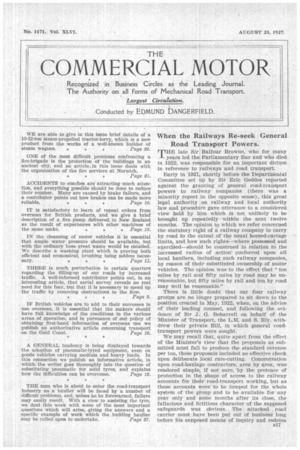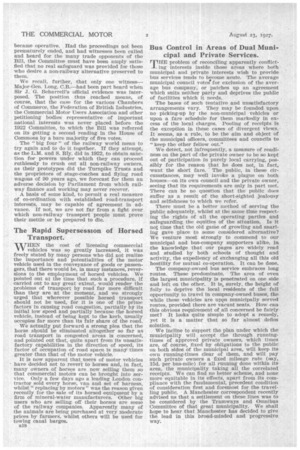When the Railways Re-seek General Road Transport Powers.
Page 35

Page 36

If you've noticed an error in this article please click here to report it so we can fix it.
MBE late Sir Balfour Browne, who for many years led the Parliamentary Bar and who died in 1922, was responsible for an important dictum in reference to railways and road transport.
Early in 1921, shortly before the Departmental Committee set up by Sir Erie Geddes reported against the granting of general road-transport powers to railway companies (there was a minority report in the opposite sense), this great legal authority on railway and local authority Jaw and procedure gave utterance to a considered view held by him which is not unlikely to be brought up repeatedly within the next twelve months. The opinion to which we refer concerned the statutory right of a railway company to carry by road to the extent of the usual horsed-cartage limits, and how such rights—where possessed and exerciSed—should be construed in relation to the increased radius of • actionconferred upon all local hauliers, including such railway companies, by reason of their substituted ownership of motor vehicles. The opinion was to the effect that " ten miles by rail and fifty miles by road may be unreasonable, but fifty miles by rail and ten by road may well be reasonable."
There is little doubt that our four railway. groups are no longer prepared to sit down to the position created in May, 1922, when, on the advice of their leading counsel, and following the evidence of Sir J. G. Beharrell on behalf of the Minister of Transport, the L.M. and S. my. withdrew their private Bill, in which general roadtransport powers were sought.
We may. recall that, quite apart from the effect of the Minister's view that the proposals as submitted must fail to produce the standard revenue per ton, those proposals included no effective check upon deliberate local rate-cutting. Concentration upon road-haulage contractors, area by area, was rendered simple, if not sure, by the pretence of protection in the shape of access to the railway accounts for their road-transport working, but as these accounts were to be lumped for the whole system of the group and to be available for' any year only and some months after its close, the fallacious and fictitious character of the supposed safeguards was obvious.. The • attackedroad carrier must have been put out of business long before his supposed means of inquiry and redress became operative. Had the proceedings not been prematurely ended, and had witnesses been called and heard for the many trade opponents of the Bill, the Committee must have been amply satisfied that no real safeguard was provided for those who desire a non-railway alternative preserved to them.
We recall, further, that only one witnessMajor-Gen. Long, C.B.—had been part heard when Sir .1. G. Beharrell's official evidence was interposed. The position thus reached means, of course, that the case for the various Chambers of Commerce, the Federation of British Industries, the Commercial Motor Users Association and other petitioning bodies representative of important national interests was never placed before the 1922 Committee, to which the Bill was referred on its getting a second reading in the House of Commons by a bare majority of five votes.
The "big four" of the railway world mean to try again and to do it together. If they attempt, as the L.M. and S. My. did in 1922, to obtain sanction for powers under which they can proceed ruthlessly to crush out all non-railway owners, as their prototypes did the Turnpike Trusts and the proprietors of stage-coaches and flying road wagons of 90 years ago, we forecast for them an adverse decision by Parliament from which railway finance and working may never recover.
A basis of some kind, to permit a real measure of co-ordination with established road-transport interests, may be capable of agreement in advance. If not, we are not far from a fight over which non-railway transport people must prove their mettle or be prepared to die.
The Rapid Supersession of Horsed Transport.
-WHEN the cost of licensing commercial vehicles was so greatly increased, it was freely stated by many persons who did not realize the importance and potentialities of the motor vehicle used in the conveyance of goods or passengers, that there would be, in many instances, reversions to the employment of horsed vehicles. We pointed out at the time that such a procedure, if carried out to any great extent, would render the problems of transport by road far more difficult than they are at the moment, and we strongly urged that wherever possible horsed transport should not be used, for it is one of the prime factors in causing road congestion, partially by its initial low speed and partially because the horsed vehicle, instead of being kept to the kerb, usually occupies far more than its fair share of the road.
We actually put forward a strong plea that the horse should be eliminated altogether so far as road transport in congested areas is concerned, and pointed out that, quite apart from its unsatisfactory capabilities in the direction of speed, its factor of occupation of road spaca is many times • greater than that of the motor vehicle.
It is now apparent that users of motor vehicles have decided not to revert to horses and, in fact, many owners of horses are now selling them so that commercial motors can be brought into service. Only a few days ago a leading London contractor sold every horse, van and set of harness, whilst " replacing by motors" was the reason given recently for the sale of its horsed equipment by a firm of mineral-water manufacturers. Other big users who are selling off their horses are some of the railway companies. Apparently many of the animals are being purchased at very moderate prices by farmers, whilst others will be used for towing canal barges.
S
Bus Control in Areas of Dual Municipal and Private Services.
METE problem of reconciling apparently conflict1_ ing interests inside those areas where both municipal and private interests wish to provide bus services tends to become acute. The average municipal council votes`for exclusion of the average bus company, or patches up an agreement which suits neither party and deprives the public of facilities which it needs.
The bases of such tentative and unsatisfactory arrangements vary. They may be founded upon no picking-up by the non-municipal vehicles or upon a fare schedule for them markedly in excess of the local charges. Pooling of receipts is the exception in these cases of divergent views. It seems, as a rule, to be the aim and object of the municipal officers, committees and councils to "keep the other fellow out."
We detect, not infrequently, a measure of readiness on the part of the private owner to be so kept out of participation in purely local carrying, possibly for the reason that he does not, in fact, .want the short fare. The public, in these circumstances, may well invoke a plague on both houses—on its own council and the private owner, seeing that its requirements are only in part met. There can be no question that the public does suffer as a result of the short-sighted jealousy and selfishness to which we refer.
There must be a better method of serving the public adequately, whilst at the same time respecting the rights of all the operating parties and safeguarding the equities of the situation. Is it no time that the old game of growling and snarling gave place to some considered alternative? We venture most strongly to commend to our municipal and bus-company supporters alike, in the knowledge that our pages are widely read and studied by both schools of thought and activity, the expediency of exchanging all this old hostility for mutual co-operation. It can be done.
The company-owned bus service embraces long routes. These predominate. The area of even the largest municipality is penetrated on one side and left on the other. It is, surely, the height of folly to deprive the local residents of the full opportunity to travel in company-owned buses, the while these vehicles are upqn municipally served routes, provided there are vacant seats. How can this obvious requirement of all concerned be fairly• met? It looks quite simple to adopt a remedy, yet it is a matter that so far almost defies solution.
We incline to support the plan under which the municipality will accept the through runningtimes of approved private owners, which times are, of course, fixed by obligations to the public on both sides of the municipal area, will keep its own running-times clear of them, and will pay such private owners a fixed mileage rate (say, 15d. per bus-mile) for all running done within its area, the municipality taking all the correlated receipts. We can find no better scheme, and none more equitable in its effects, apart from its compliance with the fundamental, precedent condition of consideration first and foremost for the travelling public, A Manchester correspondent recently advised us that a settlement on these lines was to be considered by the Tramways and Omnibus Committee of that great municipality. We shall hope to hear that Manchester has decided to give the lead in this broad-minded and progressive way.




































































































